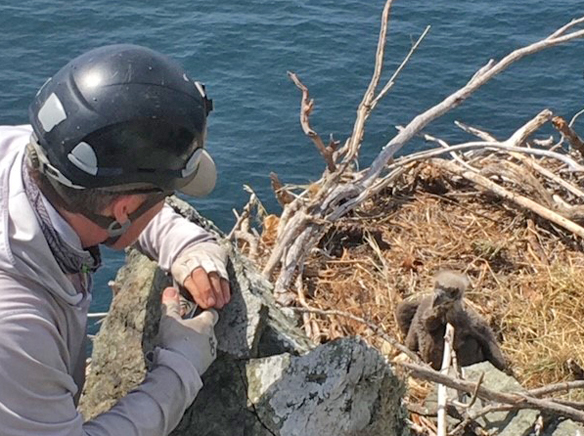
By Donald Beaver
In an almost ironic twist of fate, Two Harbors residents, Chase and Cholyn prematurely became what human parents are referred to when their children leave home. That’s right, they found themselves “empty nesters” but not in the way intended.
An Island bird of prey tragedy was averted Tuesday morning at the Two Harbors bald eagle nest when a three-person team led by long-time Institute for Wildlife Studies (IWS) biologist Dr. Peter Sharpe returned a three-week-old eaglet to its lofty perch high above the Pacific Ocean. The chick had been accidently knocked out of the nest the day before when one parent flew from the nest.
The juvenile had been nestled close to the talons of the adult in order to benefit from the shade cast by the much larger bird. It was sent over the edge of the four-foot wide nest to a small ledge about 10 feet below where it had to spend a solitary and hungry night.
The nest has a webcam sponsored by Explore.org which may be found at iws.org and frequently has hundreds of viewers watching live as the majestic raptors engage in their daily routines. Upon witnessing the shock of the eaglet falling out, some of its devotees immediately began to notify IWS and the Catalina Island Conservancy to ask for an immediate rescue operation.
Once Dr. Sharpe was aware of the situation, he arranged to have a group consisting of Catalina Island Conservancy/American Conservation Experience Wildlife Researcher Krysten Martin and IWS volunteer Donald Beaver join him on the bold rescue expedition set for early the next morning.
The raptor rescuers encountered many obstacles on their hike out to the nest. Early on, while they were maneuvering across rocky precipices above Catalina Harbor, waves were landing at their feet. Soon thereafter, dense brush obscured the primitive trail. A rattlesnake greeted the team with the sound of its eponymous interlocking rings of keratin to let them know they were not welcome.
Extremely steep terrain made it necessary for the team to cling to lichen covered rocks as they traversed to the point where the nest clung precipitously. As they grew nearer, parent eagles Chase and Cholyn also began to show their displeasure with the human interlopers. There were many swoops down towards Sharpe and the others, sometimes so close the swoosh of the birds’ six-foot wingspan could be loudly heard.
Helmets were worn by all of the redeemers before getting to that point. (Now in his 26th season of monitoring the Channel Islands’ eagles, early in his career Sharpe once had the most unfortunate experience of being attacked by a parent eagle as he was handling its offspring. The result was four holes in his head from the extremely sharp talons!) Audible cries from the circling parents were also heard as the group arrived at the nest and began the rescue in earnest.
The intrepid leader, Dr. Sharpe, was happy to confirm the chick was not too far down from the nest but it would still require him to be fully harnessed and anchored before he could descend to the downy darling. With his team providing encouragement, the biologist remarked, “I don’t like it when things go terribly wrong.”
Fortunately, things did not go wrong on this occasion as he was able to quickly get to the eaglet, grasp it safely before squiring it into a duffle bag for his climb back up to where the waiting duo watched from above. The precious cargo was handed off to researcher Martin and once he made it back up himself, Sharpe began to make some safety enhancements to bring the nest up to the latest in building code standards. He did this by using branches which had previously fallen from the nest to build up walls for helping prevent any future fall outs.
Next was a brief examination of the gray 3-4-pound chick which found it to be uninjured from the experience.
It was then very carefully placed into the nest as it looked upon its rescuers with piercing eyes. Did the eaglet have anything to say to the three people? We’ll never know. But Sharpe did have soft parting words for the still observant parents Chase and Cholyn as they continued to watch from the sky above, “You’re welcome.”










